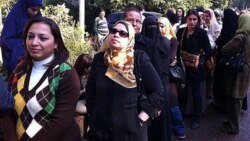After the initial euphoria that followed the successes of the Arab Spring, women are once again being pushed out of the public forum. Women, who were at the forefront of democratic change, who marched shoulder to shoulder with men in Sidi Bouzid and Benghazi, Taiz and Cairo, are being denied their rights as citizens and human beings.
Under the Obama Administration, women’s empowerment has become an integral part of the Foreign Policy of the United States. But “will the full inclusion of women – practically speaking, politically speaking, economically speaking make a difference amid this uncertain, even chaotic transition?” asked Under Secretary for Public Diplomacy and Public Affairs Tara Sonenshine.
First, she said, “fairness and human dignity are universal values.” But beyond this, women bring so much more to the table. Countries that shut women out of the workplace and the public arena limit their chances of success -- politically, economically and democratically.
“Women are the bellwether, the barometer and the building bricks of greater economies, democracies and countries,” said Under Secretary Sonenshine. “Women are needed in decision making circles to bring about political change. But, until there is change, women will have difficulty in attaining influential political positions.”
“Because we know women are the keys to prosperous economies and robust democracies, we promote free, fair, and transparent economies, enhanced security, human rights – and we make sure women and girls are central to those policies,” said Under Secretary Sonenshine.
“We work with civil society and the private sector to promote women’s social and economic development, integrate women into peace and security building, address and prevent gender-based violence, and ensure women’s full participation in civic and political life.”
“While it is inevitable that building a democracy takes time, we can never stop talking, never stop pushing, and never stop working for women in the region,” said Under Secretary Sonenshine. “Women’s rights aren’t just right, they’re necessary – because countries are stronger when everyone has a stake in the system. It’s about success – and that is something we need to plant deep into the soil, if we want this Arab Spring to really bloom.”
Under the Obama Administration, women’s empowerment has become an integral part of the Foreign Policy of the United States. But “will the full inclusion of women – practically speaking, politically speaking, economically speaking make a difference amid this uncertain, even chaotic transition?” asked Under Secretary for Public Diplomacy and Public Affairs Tara Sonenshine.
Countries that shut women out of the workplace and the public arena limit their chances of success.
“Women are the bellwether, the barometer and the building bricks of greater economies, democracies and countries,” said Under Secretary Sonenshine. “Women are needed in decision making circles to bring about political change. But, until there is change, women will have difficulty in attaining influential political positions.”
“Because we know women are the keys to prosperous economies and robust democracies, we promote free, fair, and transparent economies, enhanced security, human rights – and we make sure women and girls are central to those policies,” said Under Secretary Sonenshine.
“We work with civil society and the private sector to promote women’s social and economic development, integrate women into peace and security building, address and prevent gender-based violence, and ensure women’s full participation in civic and political life.”
“While it is inevitable that building a democracy takes time, we can never stop talking, never stop pushing, and never stop working for women in the region,” said Under Secretary Sonenshine. “Women’s rights aren’t just right, they’re necessary – because countries are stronger when everyone has a stake in the system. It’s about success – and that is something we need to plant deep into the soil, if we want this Arab Spring to really bloom.”






